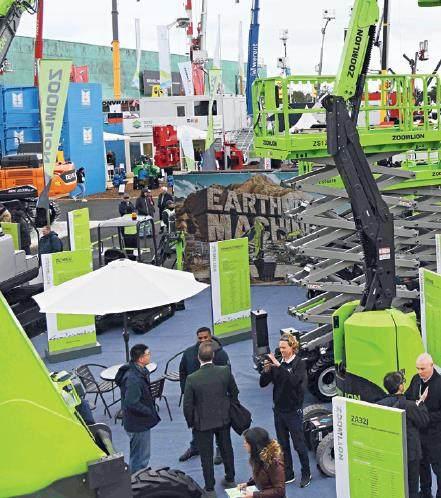Friends from Afar
HUANG YUHAO


President Xi Jinpings European trip hasstrengthened China-Europe ties amidprotectionism and geopolitical tensions.
FROM May 5 to 10, Chinese President XiJinping paid state visits to France, Serbia,and Hungary. Being his first European tripin about five years, it consolidated Chinasrelationships with the three countries and Europeas a whole. The four states looked back on thehistory of their friendships, signed multiple cooperationagreements, and reached a consensuson promoting stable and sound development ofChina-Europe relations.
Great Minds Think Alike
Upon his arrival in Paris on May 5, PresidentXi Jinping received a warm welcome in Chinesefrom Gabriel Attal, Frances youngest ever modernprime minister. This marked President Xisthird state visit to France. It was six decades agothat the then-French President Charles de Gaulledecided to establish diplomatic relations withthe Peoples Republic of China (PRC), thus makingFrance the first major Western country to doso. “During the 60 years since then, our bilateralrelations have always stayed abreast of Chinasrelations with Western countries, setting a primeexample for countries with different social systemsto coexist in peace and pursue win-wincooperation,” President Xi said.
In 2023, the bilateral trade volume betweenChina and France reached US $78.9 billion, nearly800 times that of six decades ago. Total two-wayinvestment also exceeded US $26 billion. China isnow Frances biggest trading partner outside theEU, and Frances role as Chinas trading partnerremains crucial for China.
partner
China is nowFrancesbiggest tradingpartneroutside the EU,and Francesrole as Chinastrading partnerremains crucialfor China.
On May 6, President Xi Jinping attended theclosing ceremony of the sixth meeting of theChina-France Business Council with French PresidentEmmanuel Macron, and delivered an importantspeech. “As one of the earliest participantsin Chinas reform and opening-up, France hascontributed to Chinas modernization drive andbenefited from it,” President Xi said at the event.“We always view France as a priority and trustworthypartner of cooperation. We are committedto expanding our business relations in both widthand depth by opening up new areas, creating newmodels, and fostering new growth areas.”
President Xis speech received a warm responsefrom the French business community. GuillaumeFaury, CEO of Airbus, said that Airbus valuesits partnership with China and will continue tohonor its commitments, consistently invest inthe Chinese market, and enhance cooperation ininnovation with Chinese partners, while SabrinaSoussan, chairman and CEO of Suez, said that “President Xi Jinping's speech was inspiring. Thereis great potential for cooperation between Franceand China in key areas such as environmentalprotection, renewable energy, and digital transformation,”according to Xinhua.
President Macron and President Xi enjoyed theperformance, in Songyuan, Guangzhou, in SouthChinas Guangdong Province, during the Frenchpresidents visit to China in April 2023, of a thousand-year-old melody titled High Mountains andFlowing Water . Representing a cherished friendshipin Chinese culture, the melody may hence beinterpreted as a wish for close friendship betweenChina and France.
Macron recalled the deep and lasting impressionthat the meeting in Songyuan left on him onMay 7, when he and his wife received President XiJinping and his wife in Tarbes, Hautes-PyreneesDepartment of France, home of Macrons latematernal grandmother. There they watched localvillagers perform the shepherds dance unique tosouthern France, and discussed important issueswhile enjoying local delicacies in the snowymountains. This informal meeting, signature of their mutual visits, enabled the two presidents toengage in in-depth discussions.
President Xi said at this meeting, “Although theChinese and French civilizations, one in the Eastand the other in the West, have different valuesand social systems, both are committed to intercivilizationexchanges and mutual learning.” Chinaand France should reserve differences while seekingcommon ground, like close friends, Xi noted.
Frances decision to establish diplomatic relationswith China amid the divided and volatileethos of the Cold War testifies to that countrysspirit of independence. Such a spirit is especiallyrelevant today, as the U.S., rallying its Westernallies, tries to contain Chinas development outof geopolitical considerations. Frances strategicautonomy merits commendation, in light of thebiased stance of many countries due to being inthe thrall of the U.S. As French writer RomainRolland once said, “It is so much easier to allowoneself to be guided than it is to think for oneself.This abdication is the kernel of the mischief.”
Closer than Ever
Upon concluding his visit to France, PresidentXi Jinping made his second ever visit to Serbia onthe evening of May 7 — a date that marks the 25thanniversary of the NATO bombing of the Chineseembassy in Yugoslavia that killed three Chinesejournalists.
President Xi wrote in an article published in localmedia: “The Chinese people cherish peace, butwe will never allow such tragic history to repeatitself. The China-Serbia friendship, forged with theblood of our compatriots, will stay in the sharedmemory of the Chinese and Serbian peoples, andwill inspire us to march forward with big strides.”The incident has heightened the empathy betweenChina and Serbia.
China and Serbia are ironclad friends who haveunfailingly helped each other in times of need.After the 2008 earthquake in Sichuan ProvincesWenchuan, Serbia immediately came to Chinasaid by donating needed supplies. The assistancethat China gave to Serbia during the COVID-19pandemic included sending protective equipmentand medical instruments, as well as a group of medical experts. In 2016, the two countries establisheda comprehensive strategic partnership,the first such relationship in Central and EasternEurope.
A notable example of China-Serbia cooperationis that of the Smederevo Steel Plant, which due tofierce market competition and serious managementproblems was on the verge of bankruptcy.In April 2016, HBIS Group, one of Chinas largeststeelmakers, acquired the plant and renamedit HBIS Serbia. The company rapidly turned aprofit, and in 2018 became the countrys largestexporter.
On April 29, 2024, President Xi replied to aletter from Serbian workers in HBIS SerbiasSmederevo Steel Plant, saying, “The sound developmentof the plant is a striking epitome ofhigh-quality Belt and Road cooperation betweenChina and Serbia, as well as a paradigm of ourmutually beneficial cooperation. The steelworkersare participants, witnesses, contributors to,and beneficiaries of China-Serbia friendly cooperation.”
During this visit, President Xi presented SerbianPresident Aleksandar Vucic with replicated models made from the steel produced by HBISSmederevo Steel Plant — gifts signifying thatthe bilateral friendship is as strong as that steel.President Xi told his Serbian counterpart, “Weare steel-clad friends now, which is even closerthan ironclad friendship.” The two presidents announcedthe building in the new era of a China-Serbia community with a shared future, the firstof its kind in Europe, so opening up a new chapterin the history of bilateral relations.
On the evening of May 8, President Xi arrivedin Hungary, the last stop on his European trip.Upon landing in Budapest, the countrys capitalcity, President Xi was presented with a bouquetof flowers by a young Hungarian woman calledOlah Tamara. This was the same girl who hadpresented him with flowers 15 years ago, when hewas Chinese vice president. President Xi recalledthat moment the next day, when he met HungarianPresident Tamas Sulyok, saying, “From a littlegirl to a beautiful young lady, doesnt this symbolizethe development of friendship between Chinaand Hungary?”
Like Serbia, Hungary is also a close friend ofChina in Europe, and was one of the first countriesto establish diplomatic relations with thePRC in 1949. This year marks the 75th anniversaryof their diplomatic ties. President Xi wrote duringthe state visit he paid to the country that therelationship between China and Hungary “is atits best in history, and has embarked on a goldenvoyage.” The two countries announced during thisvisit the elevation of their bilateral relationshipsto an all-weather comprehensive strategic partnershipfor the new era, promoting bilateral relationsand practical cooperation to an even higherlevel.
Hungary was the first European country tosign a Belt and Road cooperation document withChina. The country is also Chinas top investmentdestination and its important trading partnerin Central and Eastern Europe. Several leadingChinese new-energy vehicle businesses, includingBYD and CATL, have invested in Hungaryand opened factories there. The construction ofthe Hungary-Serbia railway, a flagship project ofthe Belt and Road Initiative (BRI), has continued steadily to advance.
Hungary is a member of the EU, and has supportedChina in such China-related issues as theTaiwan question. In a meeting with Prime MinisterViktor Orban, President Xi expressed thehope that “Hungary will take the opportunity ofassuming the rotating presidency of the EuropeanUnion in the second half of this year to promotesteady and sound development of China-EUrelations.”
Chinas close relations with Serbia and Hungaryhave shown other European countries that Chinais a friend, not a foe, and cooperation with Chinapromises peace and prosperity. As Balazs Orban,political director of Hungarian Prime MinisterViktor Orban, told Xinhua, “For us, China is not athreat, but an opportunity.”
Moving China-Europe RelationsForward
President Xis European trip both improvedChinas relations with the three countries anddemonstrated that countries with different systemsand cultures can work together. The EU seesChina as a partner for cooperation, an economiccompetitor, and a systemic rival. In recent yearsit has stressed the role of “a systemic rival” andeven sought to “de-risk” from China. PresidentXi voiced his hope on May 6, during the China-France-EU Trilateral Leaders Meeting withFrench President Emmanuel Macron and EuropeanCommission President Ursula von der Leyen,that “the EU institutions will develop the rightperception of China and adopt a positive Chinapolicy.”
A correct perception of China is the startingpoint for strengthening bilateral relations thatenable both sides to flourish. Tian Dewen, deputydirector of the Institute of European Studies of theChinese Academy of Social Sciences, told GlobalTimes that China-EU relations have encountereddifficulties in the past five years, but that China-France relations have been relatively stable, whichrelates directly to the Macron governmentsimplementation of positive and pragmatic relationswith China. Europes strategic autonomy,championed by France, deserves other European countries serious consideration in regard to thehandling of their relations with China.
correct perception
A correctperception ofChina is thestarting pointfor strengtheningbilateralrelations thatenable bothsides to flourish.
Strengthening bilateral relations also requiresproper management of the economic and tradefrictions occurring between China and the EU inrecent years. For example, under the flag of protectionism,the EU published a notice of initiationof anti-subsidy investigations into the imports ofbattery electric vehicles (BEVs) from China, andwrongfully accused China of overcapacity.
President Xi personally addressed the EUs concerns,suggesting that Chinas new energy industryhas made real progress in open competitionand represents advanced production capacity. Inaddition to increasing global supply and alleviatingthe pressure of global inflation, it contributessignificantly to global climate response and greentransition. The so-called “problem of Chinas overcapacity,”therefore, does not exist, either from theperspective of comparative advantage or in lightof global demand.
As China and the EU are each others secondlargest trading partners, the conflicts betweenthe two sides regarding economic and trade issuesshould not present any obstacle to win-wincooperation. President Xi told Macron and vonder Leyen that China and the EU “have extensivecommon interests and broad space for cooperationin the green and digital transition. It is necessarythat we properly address economic and tradefrictions through dialogue and consultation andaccommodate each others legitimate concerns.”
Additionally, in an interview with the Economistprior to President Xis visit, President Macronsaid that China is crucial when it comes to majorquestions in regard to the planet, like climateand biodiversity. He concluded, “There will be noprogress on climate and biodiversity if there is noagreement with the Chinese on these issues.” TheFrench president believes that Europes role is todo everything it can to facilitate a consensus onthese major climate and biodiversity issues.
Despite their differences in political systemsand cultural traditions, facts have shown that itsin the interests of China and the EU as well as thewhole world to work together and crack the commonchallenges.

